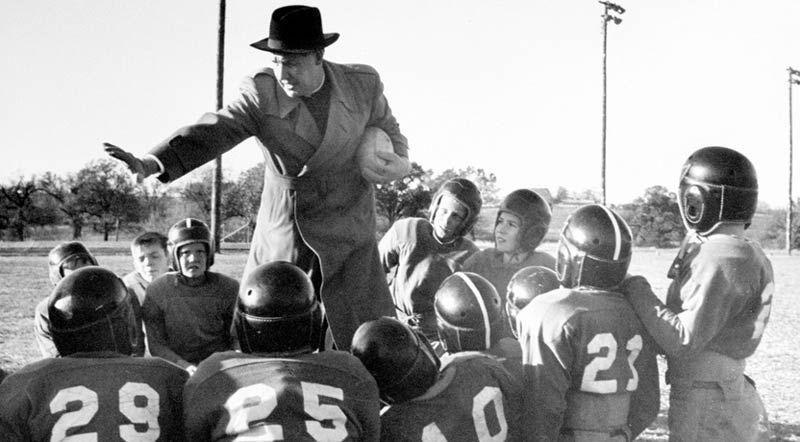
I grew up in a coach’s house and witnessed the toll that coaching takes on a family. My father coached for 47 years and won 644 games as a basketball coach. By the time I was 15, my dad had coached at five schools and we had moved four times. By then, we were treading water financially. Our family car was a broken-down station wagon with a defective gas gauge and a dented driver’s side door that wouldn’t open. Needless to say, I didn’t drive to my prom.
My mom was the glue that held it all together. Somehow, mom found ways to provide food, clothing, and shelter for six people with limited resources.
In high school, I was ranked fourth in my graduating class and planned to attend college to become a doctor. However, after my first year of pre-med, my gut told me to drop the doctor idea and do what I loved instead.
“Tell me, what is it you plan to do, with your one wild and precious life?” – Mary Oliver, “A Summer Day”
I wanted the life that my father had. I was certain at age 19, and that same certainty has never left me. I wanted to wake up every day excited—excited about the players on my team, the next game, and the next season. I wanted the emotional connection that coaches have with their athletes. I wanted the winning and losing, and everything that went with it.
Most coaching careers end badly. Many are train wrecks. Marriages suffer. Families become dysfunctional. Every year, hundreds of coaches resign “to spend more time with their family.” If a coach is going to survive the long haul, he must take care of his family first. Nothing ends a coaching career faster than problems at home.
Take care of your family first if you want to survive as a coach in the long term. Share on XI write this with a proud but humble heart. This article is not an attempt to impress anyone. As I enter my 36th year of teaching and coaching, I believe I have something of value to share with others. My survival guide may not be your survival guide. Even though my 18 tips are unique to my life, some of them are universal. I hope young coaches may benefit.
1. Go Home for Lunch
I live four minutes from Plainfield North High School. For more than 30 years of my career, I have lived within a four-minute drive of my workplace.
To my knowledge, I am the only teacher at Plainfield North who goes home for lunch. Rain, sleet, or snow, I go home. Stale air and fluorescent lighting can distort your senses. In addition, eating lunch with unappreciated, underpaid, curriculum-driven teachers is no way to keep your spirits high.
But here’s the more important issue. If you live close enough to go home for lunch, you also have a quick drive to work and a quick drive home. I work with teachers who endure a two-hour round-trip commute. I guarantee you one thing: those teachers aren’t going to coach long. With coaching, my workweek can approach 70 hours. If I added six to 12 hours of driving to a 70-hour week, something’s going to break.
2. Choose Wisely
In my introduction, I mentioned my mom. She was a mother of four by the age of 30 and gave up a promising career, like most women of the ’50s, in order to become a wife and a mother. My dad chose wisely. Not only did he marry an attractive high school valedictorian from a solid family, but he also married a girl who understood sports. Three of my mom’s brothers played college football; two of them became career football coaches.
Venus & Mars marriages may not work so well for coaches.
I married Jill in 1983. We were both teachers. Before we got together, I knew Jill attended every home basketball game at Harrisburg High School. I was the head basketball coach. I also learned Jill was a huge football fan.
To this day, a road trip to a college football game ranks near the top of Jill’s favorite activities. On our 20th anniversary we traveled to Austin, Texas, where we experienced the Sixth Street music scene every night and attended Texas Longhorn football practices during the day. I’ll never forget a booster pointing out their redshirt freshman, Vince Young, and describing him as a tall Michael Vick.
3. Buy a Backyard Pool
In 1993, I won a small settlement for a wrongful dismissal as head basketball coach. We invested around $3,000 into a backyard pool for our family of six. For the next 11 years, our pool was the center of family life.
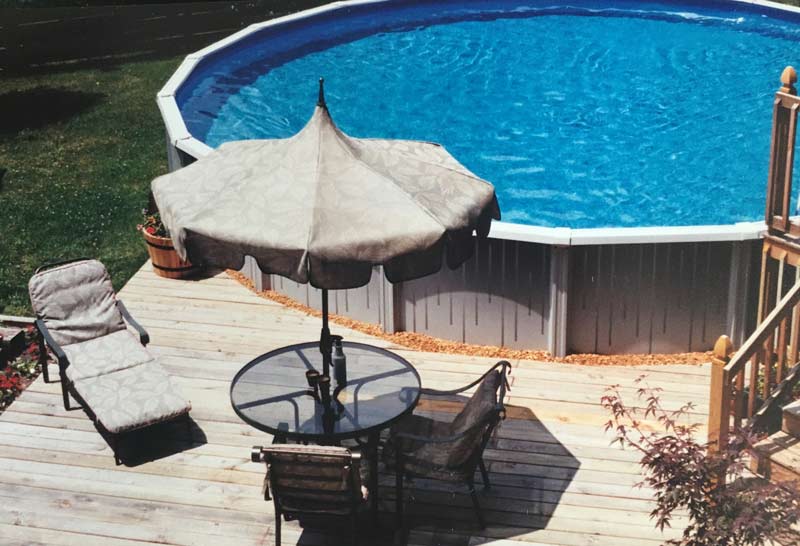
As a coach, I worked 50-70 hours every week from August until May. In my first eight years of teaching, I coached football, basketball, and track. Over the past 35 years, I’ve coached 72 teams. And, as every coach knows, coaching doesn’t end when the season is over.
For the career coach, summer must become summer vacation. Creating a backyard playground makes sense.
4. Discourage Baseball
Before you question my patriotism, let me explain. I am a lifelong baseball fan. I sat in the bleachers of Wrigley Field when the ticket price was $1.25 (1976). I attended the famous Disco Demolition Night at Comiskey Park in 1979. I played baseball until I defected to the track team in high school. I’ve played fantasy baseball my entire adult life. I named my 2016 teams, “Quantum Entanglement” and “Nikolaus Kopernikus.” I have baseball cred.
My boys played Whiffle ball in the streets. I played catch with my sons like every good American father. They also played Little League baseball.
With three boys playing on three teams in three leagues, Jill and I started to question our quality of life. We initiated a tag team plan. We had three jobs to share: delivery, attendance for a couple of innings, and pickup. The baseball community was probably appalled at our behavior. The normal family would get to the game 30 minutes ahead of time and set up their lawn chairs, with their aunts and uncles and grandparents also joining them. Not us.
Eventually, it got to the point where our oldest son, Alec, was offered a spot a team that would travel to other towns. Recognizing the detrimental effect this would have on summer vacation, I offered Alec the opportunity to attend three basketball camps of his choice in lieu of baseball. Alec attended Duke, Illinois, and Indiana. Yes, I bribed my son to ditch baseball.
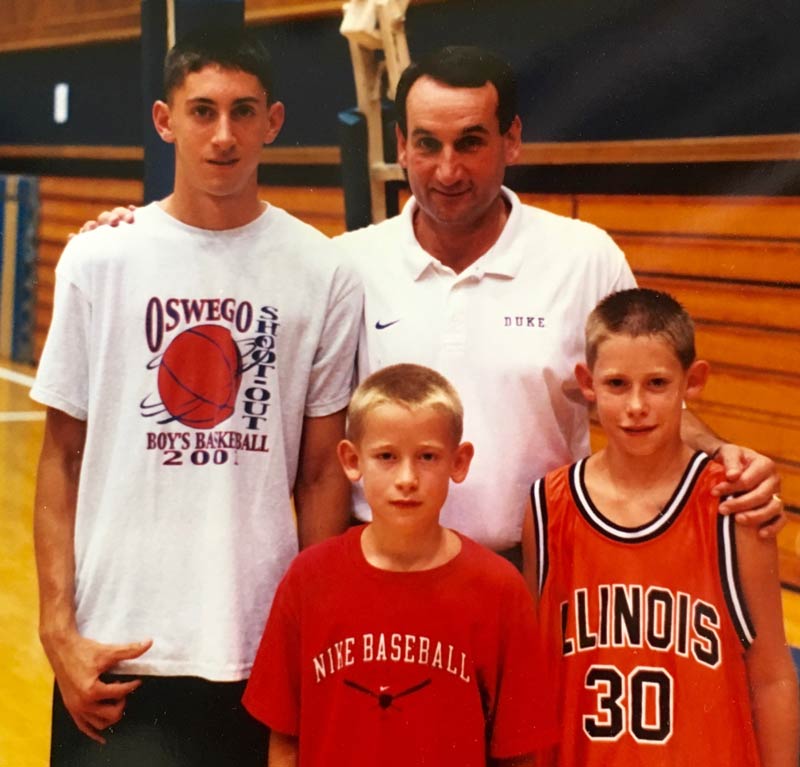
Today, youth baseball is the tail that wags the dog for many American families. An alarming number of kids age 6 to 18 are paraded all over the country to play in tournaments and gain national exposure. Parents invest thousands into a sport that was once relatively free. When families follow their prodigies from game to game, the fabric of family life changes. Forget about that backyard pool.
When I think of a coach giving up summer vacation in order to follow their kids’ baseball teams from Tucumcari to Timbuktu, I just shake my head.
5. Rethink Obligations
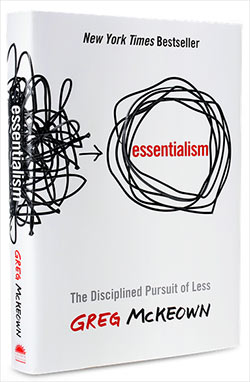
I was blown away by the book, Essentialism: The Disciplined Pursuit of Less, by Greg McKeown. I believe it to be the best coaching book ever written, even though it’s not a coaching book.
I’ve learned to say no. I have declined hundreds, if not thousands, of graduations, graduation parties, baptisms, First Communions, confirmations, funerals, weddings, school plays, family get-togethers, coach’s parties, and just about everything else you can imagine. I boycott basketball and haven’t watched an entire baseball game for years. I’m getting more selective every year.
Remember, these survival tips are mine. You may disagree. Throughout my coaching career, I’ve made decisions to simplify my life by going big on the things that mattered most to me. I’ve de-emphasized or eliminated many things that others hold dear.
Please understand I am not criticizing those who live lives of duty and obligation. I respect those who show up for their niece’s middle school graduation. I respect people who attend the funerals of distant relatives and friends of friends. Those people have made their choices and I have made mine.
6. Throw Friends Overboard
If my goals are to be a top-notch chemistry teacher, a solid coach, and the patriarch of a large family, obligations are not the only things that may get sacrificed. Friendships may also have to be reevaluated.
I learned at an early age that playing poker on Wednesday nights might not be family friendly. Going out with the guys on Saturday night was not a healthy pursuit. Road trips with college buddies may not be in the cards.
The people I call my friends today are coaches I work with and coaches from other schools. I may not spend time in friends’ backyards, but I have friends.
This gets back to McKeown’s Essentialism. Being a good friend is a wonderfully admirable trait, but it may not fit in with chemistry, coaching, and four kids. McKeown explains: “The word priority came into the English language in the 1400’s. It was singular. It meant the very first or prior thing.” In the modern world, people become overwhelmed with dozens of priorities. Too many priorities “draw us in and drown us in shallow waters.”
7. Reading Is Essential
Books are always available. They never demand my attention, and they don’t make appointments. I’ve read nearly 1,000 books in the past 40 years. To me, reading allows me to travel without leaving my home. I can’t imagine my life without reading.
When money was tight, I got my books from the public library. My Kindle is now my library. Reading fuels my teaching and coaching. Reading quiets my mind and feeds my spirit. Because of reading, I’m never bored. Never being bored is highly underrated.
8. Running Is Essential
Strangely, reading and running are connected in my brain. Back in the ’80s, my wife and I attended a show at Second City in Chicago. When I’m at a comedy club, I try not to get noticed. Nothing good comes from being singled out by a comedian. Well, on this night, I got singled out. The comedian on stage pointed at me and asked, “What are your hobbies?” I cringed and meekly answered, “Reading and running.” “The Most Boring Man in the Room” was an improv classic.
Running and reading have become the common thread of my life. Both are relatively free. Both can be done without going somewhere in a car. Both make me feel healthy. When I’m feeling stressed or out of control, I always find that two things are missing in my life: reading and running.
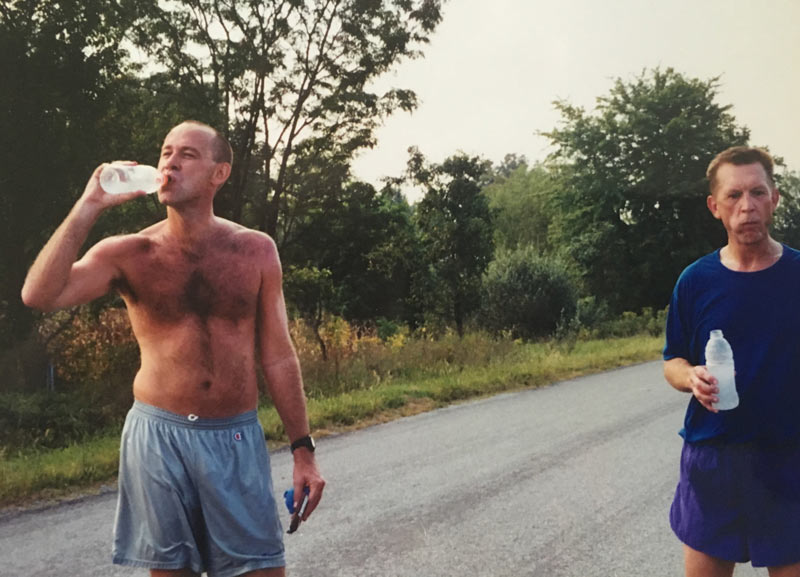
When my kids were young, every run involved pushing a baby jogger. Not only was I taking care of myself, I was also parenting. Biking, the cousin of running, serves as my alternative workout. My wife and I both rode bikes with permanent child seats attached.
9. Money: All You Need Is Enough
My father never carried a wallet; never slipped me a $5 bill. His pockets were always empty. Dad brought his paychecks home and handed them to my mom. Some people’s minds never stray from the profit margin. The struggle for the legal tender is the alpha and omega of many American men. Not my dad.
What if I had grown up in a family where money symbolized success?
As a first-year teacher in 1981, I was assigned five classes of low-level science in a 100-year-old building with no air conditioning and plaster falling off the walls. I coached football, basketball, and track. My paycheck was $499, twice a month. Renting a trailer cost me $160 and my school loan payment was more than my rent. My teaching salary didn’t exceed $52,000 until I was 47. If I measured success based on my paycheck, I am a career failure.
Teachers and coaches measure success on a different scale. Our success cannot be quantified (though poorly informed people think otherwise).
I grew up in a family who had enough to live on. My kids grew up with enough.
There’s nothing divine about living paycheck to paycheck. Small setbacks cause high anxiety. One of my life’s regrets is not being able to pay for my kids’ college educations. My 26-year-old son, Troy, recently refinanced $106K of student loans. He will pay $925 a month for the next 20 years. If I had stuck with medicine, my kids would be debt-free.
In my ITCCCA Hall of Fame speech, I told the audience, “When Jill and I got married, we were about $20,000 in debt and we rented a house. Here I am 30-some years later, and we are $20,000 in debt and we rent a house.”
10. Take Your Kids to Work
There was no separation anxiety when our kids went to kindergarten because they went to school with their mother. Whether Jill was teaching 2nd, 3rd, or 4th grade, her classroom was right down the hallway from Adrienne, Alec, Troy, and Quinn. The perfect job for a mother puts her in the same building as her kids.
All four of my kids attended my high school. I had the privilege of teaching Chemistry-I, Chemistry-II, and Anatomy Physiology to Adrienne and Alec at Harrisburg High School. In Plainfield, I taught Honors Chemistry to Troy and Quinn.
I never coached my daughter, but I coached Alec’s freshmen and sophomore football teams. I was varsity offensive coordinator when Troy started as a wide receiver during his junior and senior years. Quinn was my quarterback in sophomore football. Alec, Troy, and Quinn ran track, and all three were hurdlers.
By the way, I quarterbacked my father’s sophomore football team and started for his varsity basketball team. Dad was my World History teacher at Princeton High School in 1973.
Having keys to the gym is one of the few perks of coaching. On most Sundays, I would take my kids to the gym. It seemed like they could play there forever.
I don’t think there was ever a track meet where a couple of my kids didn’t ride the bus. They witnessed every locker room and every sideline. Not many jobs are as kid-friendly as coaching.
To this day, I share coaching with two of my boys. Alec coaches football and track at Edwardsville High School. Quinn has been my right-hand man in football and track for the past three years. Soon, he will also be certified to teach.
11. Attendance Is Not Required
I’ve known many coaches who expect their wives to support them by attending their athletic events. This is unhealthy.
Attendance at events should never be required. After a week of teaching 2nd grade (aka, “The Death March”), Jill would often require an extensive period of rest and recovery. Heading out to a Friday night football game or an all-day Saturday track meet would have done her in.
Don’t force a spouse to attend every game or meet. Any involvement should be their choice. Share on XBy the very nature of a coach’s job, the wife of a coach will be involved; very involved. Coaches take their work home. During the season, I am a coach from the time I wake in the morning until the time I go to sleep at night, and then I dream it.
Your wife may want to be your assistant, or the team mom, or super-fan. She may want to sit in the stands and bask in your popularity and hear all the lovely things parents say about you. No problem. Just make sure the involvement is her choice and not yours.
And, on the subject of attendance, never force your wife to attend coach’s parties after games; especially those football parties. The Neanderthal nature of football will often segregate the group into football-talking men in one room and babysitting women in the other. Once again, attendance is fine but not required.
12. Raise Free-Range Kids
It’s strange that so many people prefer free-range chickens, but choose to cage their kids. I don’t know when all of this changed, but parenting today can be a soul-crushing job.
At the risk of sounding like an old codger who talks about the good old days, here goes. Jill and I were born at the end of the Baby Boom. We were born before the pill made it much easier to plan births and limit family size. As kids, we walked to school and walked home. We went barefoot in the summer, climbed dangerous trees, and ate wild berries, green apples, and anything else that looked edible. We made up our own games in the backyard, made our own rules, and fought our own fights. Our dogs ran the neighborhood with us. Bikes would take us places we had never been.
When Jill and I became parents, necessity demanded we raise our kids the way our parents raised us. We were busy people with four kids and no money. Our kids walked from their school to my practice without supervision. Ninety-nine percent of my kids’ athletic development took place without uniforms, travel teams, or personal trainers. Needless to say, we didn’t arrange playdates for our kids.

If we would have raised our kids like the zombie apocalypse parents of today, there’s no way I could have continued to coach. I don’t know how modern parents do all they do. I’m sure it takes lots of sacrifice. I’m just not sure it’s necessary.
Here’s the good news: Kids don’t have to take up all of your time. Free-range kids grow up to be strong and healthy adults. As a bonus, parents of free-range kids also get to live as strong and healthy adults, instead of babysitters and chauffeurs.
13. All Work and No Play Makes Jack a Dull Boy
Coaches need to seriously consider Stephen King’s message from The Shining. Coaches are 24/7 during the season. Raising a family is a 24/7 job for two adults. What could possibly go wrong?
When Jill and I had kids, our lives changed a bit, but nowhere near the colossal change of modern parents. We didn’t give up pizza and beer. We still enjoyed live music. We still went on vacation.
Once, we drove our four kids all the way to Mexico. Actually, we got out of the car in Brownsville and crossed the Rio Grande by walking over a bridge. Another time, we drove to Las Vegas and stayed seven nights. Who takes four kids to Vegas?
We couldn’t afford it, but we went on vacation every year.
The financial advisor, Dave Ramsey, would be appalled at my lack of fiscal accountability. The idea of putting an expensive vacation on a credit card is totally irresponsible. On the other hand, my kids had only one childhood. Vacations were the best thing we did.
14. Golf Is an Addiction
Golf is a wonderful, but addictive, game. I’ve seen countless coaches resign from coaching “to spend more time with the family.” Their public declaration is a ruse. Instead, these ex-coaches play golf every day and, within a year, announce their new position as a dean, athletic director, or assistant principal.
The last time I played golf was in the 1983 “Elks Scramble” in Eldorado, Illinois, three months before I got married. I remember the day well because I lost a small fortune playing craps at a post-tournament party. I haven’t played golf since.
Seriously, golf is a time-eating monster. Playing 18 holes of golf steals the day. If this happened once per week, there wouldn’t be a problem. However, coaches don’t play golf, they intensely compete. When you want to be the best you can be, you work at it every day. When you add socializing to the time commitment, the harm to your family and coaching career may be significant.
When you consider the expense, golf can be viewed as the cocaine addiction of the sports world.
Don’t get addicted to golf. Instead, do something inexpensive, healthy, and family friendly… run.
15. Consider Writing
I did not write my first article until after my youngest son graduated from high school. It seems strange that my hobbies are now running, reading, and writing. Writing does not quiet my mind like running and reading, but there’s a special relationship between all three.
How is my writing related to running and reading? When I run, my mind gets creative. Almost all of my ideas come to me when I’m running. No one taught me to write. Reading provides my only training as a writer. The knowledge that a sentence either sounds right or sounds awkward is a product of being a reader.
Why is writing a survival tip for coaches? Writing forces you to organize your thoughts. Writing helps you to refine your coaching philosophy and articulate your beliefs.
Writing helps organize your thoughts, refine your coaching philosophy, articulate your beliefs. Share on XIf you can’t organize and prioritize your thoughts, how can you coach? Articulation is not just talking: It’s speaking in a way that connects with your athletes. Bad coaches get lost in minutia. Good coaches see things simply and emphasize the critical points. Writing is an effective way to condense and distill your thoughts.
16. Make It Look Easy
Some people have taken the advice, “fake it till you make it.” I don’t like faking it. Presenting your material with confidence is a good thing, but your material needs to be good, too. I have no respect for coaches who don’t attend clinics and don’t read.
One of my favorite Bob Dylan quotes is, “But I will know my song well before I start singing.” It takes years of work to make things look easy.
If someone shadowed me on a typical school day, he or she would probably be disappointed. I make my job look easy. No one would see the work I did to relearn the chemistry that I had long-forgotten. (I started teaching chemistry in 1997, 18 years removed from college chemistry.) No one would see the evolution of my teaching methods; making my classroom easier to manage and more fun to teach. No one would see the mistakes I made and the lessons I learned.
17. Less Is More
American high schools are inexpensive teenage daycare centers, but coaches are not babysitters. As a track coach, I’m no one’s babysitter. Coaches chase excellence. We are not in the business of keeping kids busy until it’s time for dinner.
My track team is focused on results, not practice. Like Steve Jobs, I am focused on content, not process.
I’ve witnessed “process coaches” who filled practice with nonsensical time-eaters. Below is a parody based on a couple of guys I’ve observed in my coaching career. You wouldn’t believe the garbage I’ve seen them do in an attempt to fill two hours (or three hours) of practice time.
Old School Sprint Practice (2 hours)
- Allow sprinters to play grab-ass (10 min)
- Take roll and rant about those not present (10 min)
- Stretch and waste time warming up (20 min)
- Explain workout and listen to sprinters complain (10 min)
- Preach about how today’s athletes lack toughness (10 min)
- Run 10 x 200 into the wind (30 minutes), with first 200 slow and each one after getting progressively slower
- One mile cool-down (10 minutes)
- Team meeting about lack of leadership and low enthusiasm (20 min)
My sprint practice starts at 2:45 and we never go past 3:30. We do the essentials and we go home.
Regardless of the sport, practice should be short. The maximum length of any practice, including football, should be no more than two hours.
Regardless of the sport, practice should be short. Do the essentials and then go home. Share on XShort practices are good for coaches and the families of coaches. More importantly, short practices are good for student-athletes and the families of student-athletes. I’ve witnessed my own sons come home from football practice too tired to eat. How can this be good for a teenager?
18. Divide the Labor
My grandparents led a life typical of the WW2 generation. My grandfather owned an auto parts store and my grandmother ran the home. I don’t think my grandfather ever did laundry, dishes, cleaning, cooking, or any other domestic jobs. My grandmother’s work never earned her a dollar. Life was good, especially for my grandfather.
Modern life requires a different arrangement. If both parents have full-time jobs, domestic work must be shared. For some reason, many coaches are alpha male WW2-types who come home from a 10-hour day and expect a duty-free evening.
No coach can survive without harmony at home. Raising four kids and keeping up with domestic work was overwhelming at times, but we got it done. The operative word is, of course, we.
+++
If someone asked me to sum up my article in 140 characters or less, I would answer: “Find the work you love, invest your heart and soul, then find a way to balance work and family.”
We all need to ask ourselves, “Am I investing in the right activities?”
Essentialism has taught me that we all have a choice. We can be good at a few things or we can be half-assed at everything. If you don’t have an end game, you may live by default, not by design.
“If you don’t know where you are going, you will probably end up somewhere else.” – Lawrence J. Peter
Too many people fail to make a high level of contribution because they spread themselves too thin. Their career becomes an attempt to look good, rather than actually being good. Their fraudulent performance forces them to echo the ideas of their bosses to appear competent and important.
Recently, Mike Pence, Trump’s vice presidential pick, described himself as a “Christian, Conservative, Republican, in that order.” It’s important to define yourself. If you can’t define yourself, someone else will.
I’m not a Christian Conservative Republican. I am a teacher and a coach. I am also a husband, father, and soon-to-be grandfather. Balancing coaching, teaching, and home life allowed me to be reasonably good at all three. Believe me, a state championship would be meaningless without a happy home. Winning on Friday night would seem hollow if not for my classroom.
To all of you young teacher-coaches out there, always appreciate the uniqueness of your job. You inspire kids and chase excellence on a daily basis. You have the opportunity to share your work with your spouse and kids. When you fight through those tough weeks, remember summer vacation is coming soon.
I remember telling my daughter, “It’s spelled J-O-B, not F-U-N.” I am very fortunate to have a job that still stirs my blood.
I hope my survival tips will help coaches stay in the game.
Since you’re here…
…we have a small favor to ask. More people are reading SimpliFaster than ever, and each week we bring you compelling content from coaches, sport scientists, and physiotherapists who are devoted to building better athletes. Please take a moment to share the articles on social media, engage the authors with questions and comments below, and link to articles when appropriate if you have a blog or participate on forums of related topics. — SF


great read Tony! and totally true.
This is one of the best articles I’ve ever read!!
I enjoyed your article throughly, I also love to run an read, an hope to be a track, cross country coach an possibly basketball. I have played since kindergarten but only competed in college at T&F and XC. I am interested in any other books you would suggest to read as well.
I don’t know if buying a pool would be the answer for me I live in LA the beach isn’t to far, but saying something like invest in something you have fun doing. I know people who have a rock wall in their garage, many types of things can be an outlet for fun. I also don’t know if I would throw friends overboard one of my best friends means more or as much as a brother does an I would never leave him, but I understand the importance of true and reliable friends an that some change over time.
You mentioned the old school practice of old school coaches. What is the format of the “new school” coaches track and field practice?
-Nico Jauregui
Future coach
1. Established and posted expectations
2. Captains administer warmup to younger players while coach coaches positions and focal points
3. Run speed development or speed endurance reps while coach measures performance and coaches mechanics
4. Additional skill development as needed
5. Go home
Just my opinion and how I run my practices. Tony wrote about this for Freelapusa a while back.
I agree with your general concepts Dunte.
You seem to understand an important fact … practice should be as long as needed (but never too long). Too many coaches are forced to practice a set amount of time every day. If practices must fill, let’s say two hours, there will be “filler”. Coaches need to practice by design, not be default.
Book recommendations for coaches:
1. How to Win Friends and Influence People
2. The Talent Code
3. The Sports Gene
My reading is mostly outside the sports genre.
Here is an article that talks about my practice.
http://itccca.com/11305/2016/02/what-does-your-track-practice-look-like/
I’m a female coach and I am in a different situation than coach Holler. My husband works as well as I do and our boys have always liked a variety of sports. Since they have very different body types one is short strong lean, another taller stocky, the last very tall skinny.
The oldest the short guy discovered swimming and track at age 10. The little guys both liked ayso soccer then hanging out with mom at all the track meets. Every coach in the conference knew my kids.
The tall skinny one jumped into swimming and track while my stocky guy loved Football and Track.
We ran summer track but practice only went and still goes for 11/2 hours at 5:00 pm the boys had swim practice at the same time. We made their swim meets little vacations and we made my track meets. Patrick was an All-American swimmer at Hinsdale Central his Jr and Sr yr, Jarred was an All-State swimmer and water polo player at Hinsdale Central and ran track in the summer as well as swam, Michael played football and ran track for Hinsdale Central. Jarred is now a practicing psychologist.
My whole speech when I was inducted into the hall of fame was about creativity and being able to do with out equipment. I think the phrase was nessity is the mother of invention. Don’t get fancy use your mind
Sounds like you succeeded in turning your boys into terrific athletes.
No they did that on their own. We supported the things they liked to do and it worked out well. I didn’t mention our adopted daughter who is a lot older than the boys but came into our lives at a time when she needed us. She was a brilliant student and a gifted athlete who ended up graduating valedictorian of her Sr class as well as athletic All-American. She went on to letter 4 years at The Ohio State University in Track and field as a Hurdler where she was All-big ten and academic all American
Tony,
Another good article. I really like when you mention your time in Harrisburg as it brings back memories. I graduated from HHS in 89 and had you as a science teacher I believe. Keep up the good work.
Thanks Jeremy!
I forgot to mention in my last post that girls softball is worse than baseball.
I loved this article! I have been looking for new books to read so I will look into these.
I would add Music to my survival list. It’s a staple to my sanity tho, I understand it’s not for everyone.
I can’t believe I left off music!
fantastic article, Coach! i may have been young, but thinking back to high school, i can remember several distinct things that you highlight in your article:
1. Jill and the kids were always your priority
2. swimming was a MUST
3. practices were no bullshit, intense, competitive, but ALWAYS fun…those teams LOVED one another and pushed each other hard….i still miss that at 37 years old
4. you were always reading a different book about every 2-3 days…i was always impressed by that
5. you always enjoyed being around us every single day…and not just the stars of the team…all of us
hope all is well!
Thank you Luke Wiley, PhD.
I’m so proud of your accomplishments.
Weird to think AP Biology was almost 20 years ago.
Thanks, Coach! Your opinion always has and always will matter so much to me. You were such an influence. It bears mentioning in the comments for your coaching article that you were a phenomenal teacher using the same approaches as you did for coaching. Your classes were always enjoyable and engaging.
That AP Bio class was so much fun! seems like yesterday….
This was a wonderful article. I have coached football, baseball and soccer since I was 18. I have been a soccer coach for 30 years,r
During high school I saw so many coaches go though divorce and always remember the football coach would bring his kids with him on weekends when the coaches met to watch film and as the team manage I was washing towels and uniforms from the Friday night game
I will definitely be sharing this with my assistant coaches that now work with me. It hit on so many fronts. I hope they read it and learn from it.
I am now 67 years and have been in some level of coaching since I was 18-19 years old I am so fortunate to have had wonderful teachers and coaches that trained me well for my future of coaching. I made that decision to be a coach when I was 18